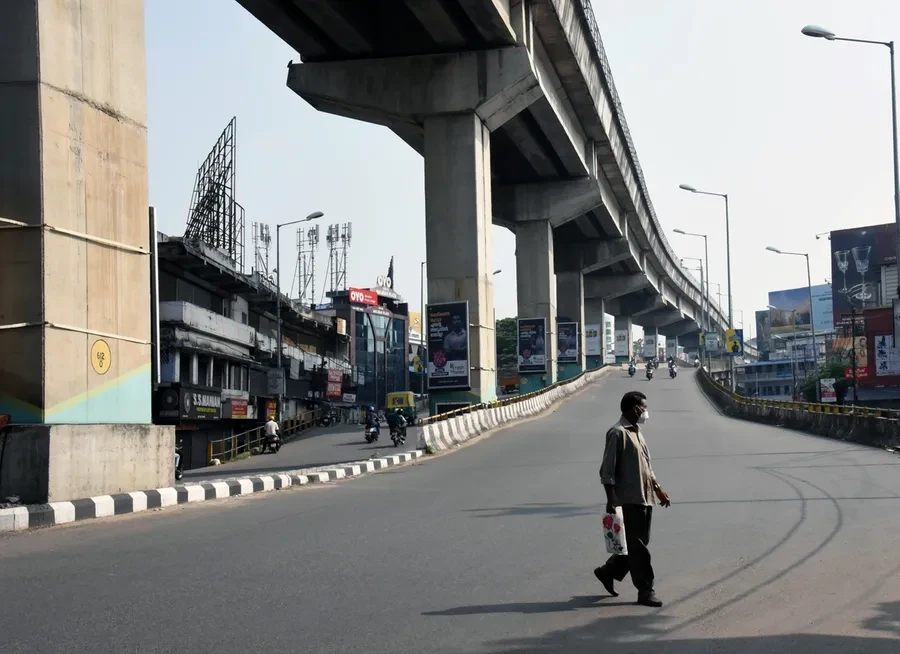Kochi: A nationwide strike or Bharat bandh is being observed on Wednesday, following a joint call by 10 central trade unions and affiliated federations.
The strike, which began at midnight on Tuesday, involves an estimated 25 crore workers across India, who are protesting against the Central government’s “anti-worker, anti-farmer, and pro-corporate policies”.
While essential services such as hospitals and emergency transport remain unaffected in most states, the bandh has disrupted government departments, public transport, postal services, banking, coal mining, and industrial operations in various regions.
Why is the Bharat bandh being held?
Trade unions have cited several long-standing grievances, including:
- The failure to conduct the Indian Labour Conference for over a decade, which unions say has stalled tripartite dialogue between workers, employers, and the government.
- The Centre’s inaction on a 17-point charter of demands, submitted in 2024. These include calls for job security, minimum wage protections, pension reforms, and a rollback of labour codes.
- Implementation of four labour codes, which the unions claim dilute workers’ rights and benefit large corporations.
- Rising privatisation of public sector units and lack of price controls on essential goods.
Participating unions include CITU, INTUC, AITUC, Hind Mazdoor Sabha, and Samyukta Kisan Morcha. However, the Bharatiya Mazdoor Sangh (BMS) has not joined the strike.
What’s affected across India
Affected services:
- Banking and postal services have been significantly impacted, with many public sector banks and post offices shut or operating at reduced strength.
- Public sector undertakings (PSUs) and central government departments have reported large-scale employee participation in the strike.
- Coal mining, industrial units, and construction sectors have been hit in union-dense areas.
- State-run transport services are disrupted in several states due to participation by motor vehicle workers.
Running normally:
- Essential services like hospitals, emergency services, drinking water supply, and newspapers continue unaffected.
- Metro rail, autos, and cabs in many urban centres are operating normally.
- Private sector offices, IT companies, and educational institutions are open in most parts of the country, though operations may vary locally.
Kerala sees near-total shutdown
In Kerala, the strike has taken full effect. Most KSRTC buses are off the roads, and taxi and autorickshaw services are severely limited. Only private vehicles are seen on the roads in cities such as Thiruvananthapuram, Kochi, and Kozhikode.
In Kochi, protesters blocked a KSRTC bus, prompting drivers to request police protection. In Kozhikode, private buses remained off the road, and only long-distance KSRTC services that began before midnight are running.
The Kerala government has declared dies non for employees who skip work today. This means no pay for government workers who do not report for duty, and no leave will be granted except for cases like medical emergencies, exams, or childbirth.
Although Transport Minister K.B. Ganesh Kumar initially claimed that KSRTC services would run normally, trade unions and LDF convener T.P. Ramakrishnan disputed the statement. The unions asserted that workers would join the bandh, and KSRTC later confirmed the dies non rule.
Schools and exams
While no formal holiday has been declared for schools and colleges, the functioning of government schools and offices is expected to be affected due to high participation from teacher and employee organisations. Universities have postponed exams in view of the strike.
Protests and public response
In Kerala and other states, processions and protest marches are being organised in major cities under the leadership of joint trade union fronts.
Police presence has been increased in several locations to maintain peace and prevent forceful shutdowns. In Thiruvananthapuram, police vehicles have been stationed at railway stations to assist stranded passengers.
Despite disruption to daily life in certain states, the bandh remains largely peaceful. Urban centres have seen limited disruption to essential movement, and no major incidents of violence have been reported as of now.
